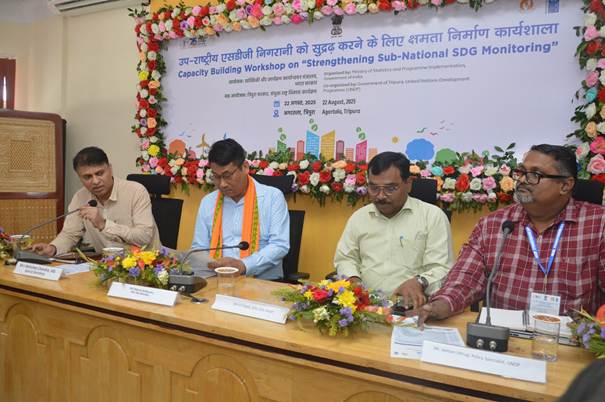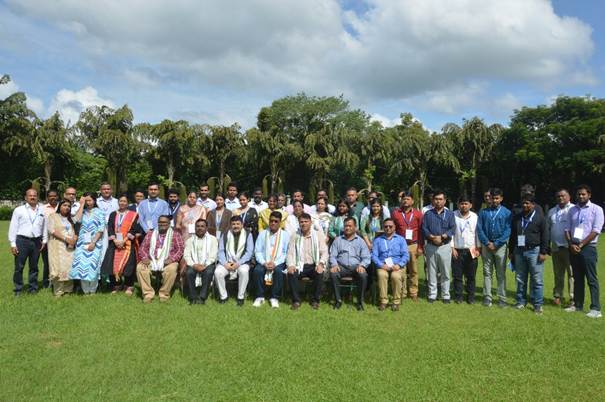Ministry of Statistics & Programme Implementation
One-day capacity building workshop on “Strengthening Sub-National SDG Monitoring” organised in Agartala
Efforts of MoSPI in developing the National Indicator Framework (NIF) and supporting States and Union Territories in formulating State and District Indicator Frameworks (SIFs/DIFs) aligned with national priorities highlighted
Workshop reaffirmed the commitment of all stakeholders towards evidence-based policymaking and achieving the targets under the 2030 Agenda for Sustainable Development
Posted On:
23 AUG 2025 3:04PM by PIB Delhi
The Ministry of Statistics and Programme Implementation (MoSPI), Government of India, in collaboration with the Government of Tripura and the United Nations Development Programme (UNDP), organized a Capacity Building Workshop on ‘Strengthening Sub- National SDG Monitoring’ at Agartala, Tripura on 22nd August 2025.The workshop was attended by participants from States and Union Territories that are still at a nascent stage in developing their own State/UT Indicator Framework.
Shri Bikash Debbarma, Hon’ble minister, Planning (Statistics) Department, Government of Tripura in his inaugural address underlined that a whole-of-government approach has been adopted for the SDGs, which are also being viewed as a tool to improve the socio-economic conditions of the people, with particular emphasis on women, children, and weaker sections of society. Delivering the key-note address, Shri S.C Malik, Additional Director General, MoSPI emphasized the importance of localized action and continuous monitoring for achieving the 2030 Agenda for Sustainable Development. He highlighted the efforts of MoSPI in developing the National Indicator Framework (NIF) and supporting States and Union Territories in formulating State and District Indicator Frameworks (SIFs/DIFs) aligned with national priorities. Stressing the need for high-quality, timely, and granular data, he underlined that monitoring is not an end in itself but a tool to improve development outcomes, ensure inclusivity, and reach the most vulnerable. Shri Malik reaffirmed MoSPI’s commitment to work in close coordination with States, line ministries, and partners to strengthen the SDG monitoring ecosystem in India. Shri Rajiv Sen, Senior Advisor, NITI Aayog in his address, focused on strengthening institutions and ensuring effective implementation of schemes through SDG monitoring. Thereafter, Shri Abhishek Chandra, Special Secretary, Planning (Statistics), Government of Tripura in his special address reiterated its commitment to advancing the 2030 Agenda by strengthening state-level data systems and localized SDG monitoring. Representative of UNDP, Mr Jaimon Uthup, Policy Specialist emphasized its commitment to supporting the Government of India and States/UTs in building robust data systems, technical capacities, and inclusive monitoring mechanisms.


Ms. Saumya Sakshi, Joint Director, MoSPI and Mr Abhishek Gaurav, Deputy Director, MoSPI provided an overview of monitoring mechanism of SDGs in India through the National Indicator Framework (NIF) and Sub-National Indicator Frameworks. MoSPI emphasized that States/UTs are accountable for monitoring the SDGs at the sub-national level. In 2019, MoSPI issued Guidelines for States/UTs to develop their SDG monitoring framework, which were updated in March 2022 and published as the report “Guidance on Monitoring Framework on SDGs at the Sub-national Level” and were circulated to all States/UTs for preparation of SIFs. Representative of UNDP discussed on Global best practices in SDG monitoring with special emphasis on localization. Thereafter, Shri Chiranjib Ghosh, JD, DES Tripura shared the experience of State of Tripura on the development of its State Indicator Framework (SIF).
The technical sessions centered on assessing State status through group exercises aimed at identifying relevant indicators for monitoring each goal and preparing draft frameworks. They also focused on implementation planning by assigning departmental responsibilities, prioritizing indicators, and formulating state-specific action plans, along with the integration of cross-cutting priorities—particularly gender and climate considerations—into State and UT Indicator Frameworks.
The workshop concluded with a call to action for all the participating States and Union Territories to strengthen their sub-national SDG monitoring frameworks, ensuring alignment with the National Indicator Framework while addressing local development priorities. It reaffirmed the commitment of all stakeholders towards evidence-based policymaking and achieving the targets under the 2030 Agenda for Sustainable Development.
***
Samrat/Allen
(Release ID: 2160103)
Visitor Counter : 56